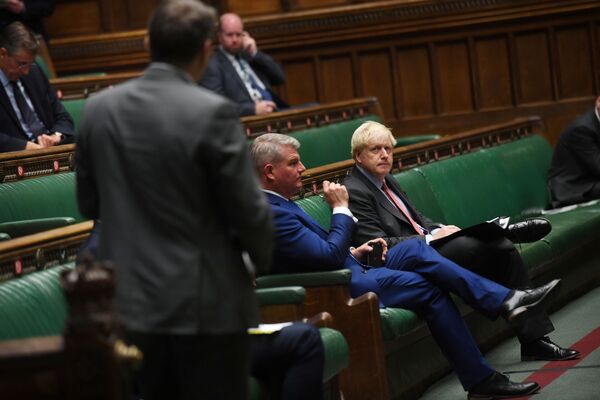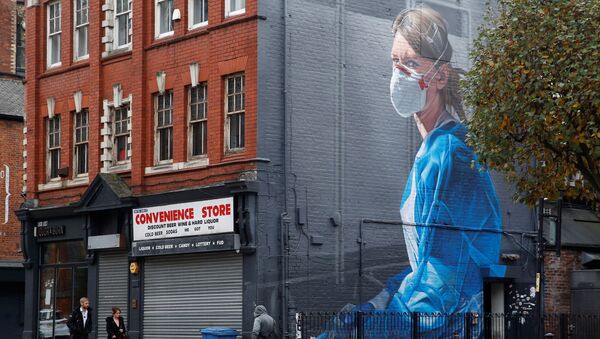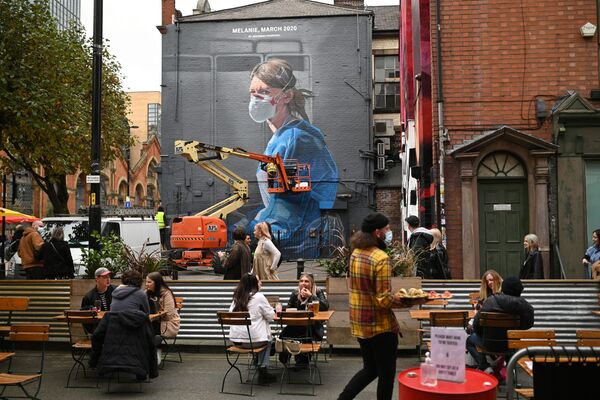The UK government has warned Greater Manchester, which has been resisting the new coronavirus lockdown measures, that unless an agreement is reached on entering Tier 3 restrictions by midday, the Prime Minister might have to intervene, reported Sky News.
Communities Secretary Robert Jenrick was cited as deploring the fact that 10 days of discussions in "good faith" had failed to yield any result.
This comes as talks on Monday with Greater Manchester Mayor Andy Burnham and other local leaders ended without an accord, as the officials have been demanding increased economic support for businesses set to be impacted by the new restrictions that entering the highest level of COVID-19 measures entails.
Jenrick was quoted as saying late on Monday night:
"The public health situation in Greater Manchester continues to deteriorate… We've offered a comprehensive package of support, in addition to the national measures that have been set out by the chancellor. I've written this evening to the mayor of Greater Manchester and to local leaders in the city region to say that, if we're not able to reach an agreement by noon tomorrow, then - with deep regret - I'll have to advise the prime minister that we're not able to reach an agreement at this time."
As for whether Tier 3 restrictions could be imposed on Greater Manchester in the absence of an accord, Jenrick said:
"That's a matter for the prime minister to decide."
According to the cabinet minister, the government’s financial package offered to local leaders was "proportionate" to the first two areas of England to enter Tier 3 restrictions - Lancashire and the Liverpool City Region.

Regarding the coronavirus situation in Greater Manchester, Jenrick warned that it is "very serious” and acknowledged that local leaders "recognise the gravity of what's happening on the ground".
"There are now more COVID-19 patients in hospitals in Greater Manchester than the whole of the South East and the South West combined," said the minister.
‘Hardship Fund’
In response to the warning from Jenrick, Sir Richard Leese, the leader of Manchester City Council, said the city would be forced to comply with the situation if ministers imposed Tier 3 restrictions. Nevertheless, he expressed hope that an accord might be reached in the remaining hours before the deadline.
Andy Burnham has been demanding from the government a furlough scheme covering 80 per cent of wages for employees of businesses that would be forced to close under the Tier 3 measures, or at least the national minimum wage. He also urged more support for the self-employed and improved compensation for businesses.
According to Burnham, Jenrick had withdrawn a previous offer of the financial support the local leaders were calling for.
"We had been encouraged by earlier discussions at an official level where the idea of a Hardship Fund, to top up furlough payments and support the self-employed, had been tabled by the government. It was both surprising and disappointing when this idea was taken off the table by the secretary of state."
The two officials had previously addressed their concerns to Boris Johnson, where they expressed "willingness to continue to work towards an agreement but reminding him that Greater Manchester has been in Tier-2 style restrictions for almost three months, and that this has taken a toll on people and businesses here", the statement added.
‘Selective Statistics’
Earlier, Mayor Andy Burnham and Sir Richard Leese had slammed Downing Street for wielding "selective statistics" as a tool to stoke fears about the perceived inability of the region's hospitals to cope with a surge in COVID-19 patients.

Ministers had cited a tripling in the number of COVID-19 cases in over-60s, and a doubling in overall hospital admissions every nine days, suggesting that Greater Manchester's intensive care might be overwhelmed with coronavirus cases by 12 November.
In a joint statement Burnham and Leese said:
"We are disappointed that the government has today sought to raise public concern about the NHS in Greater Manchester with selective statistics. Greater Manchester's ICU occupancy rate is not abnormal for this time of year and is comparable to the occupancy rate in October 2019. Also, providing information about individual hospitals does not reflect that our hospitals work as a system to manage demand.”
The local leaders deplored the fact that public fears were being “raised unnecessarily."
Professor Jane Eddleston, Greater Manchester's clinical lead for the coronavirus response, similarly refused to acknowledge that the local hospitals were “overwhelmed”, while admitting that the situation was, indeed, serious.
"I want people to realise that it is a serious position that we're in - we have seen a steady rise in our admissions, both into hospital and intensive care… But we have very detailed escalation plans in place as we have had throughout the whole of the first wave," said Eddleston.
Tier 3
Amid rising cases of COVID-19 across the United Kingdom, Prime Minister Boris Johnson set out the new three-tier system which would impose differing levels of restrictions depending on the severity of outbreak across different regions of the country.
People living in areas falling under the “very high alert level” - Tier 3 - are banned from socialising with other households in any indoor or outdoor setting, whether at home or in a public space.
Bars and pubs would be closed unless they can operate as restaurants only. People should avoid travelling outside the ‘very high’ area they reside in, or entering a ‘very high’ area, other than for work, education, accessing youth services, to meet caring responsibilities or if they are in transit.
Thus, in Liverpool, gyms, leisure centres, bookmakers and casinos have also been shut down. Manchester will face a similar situation if Tier 3 measures are introduced.



